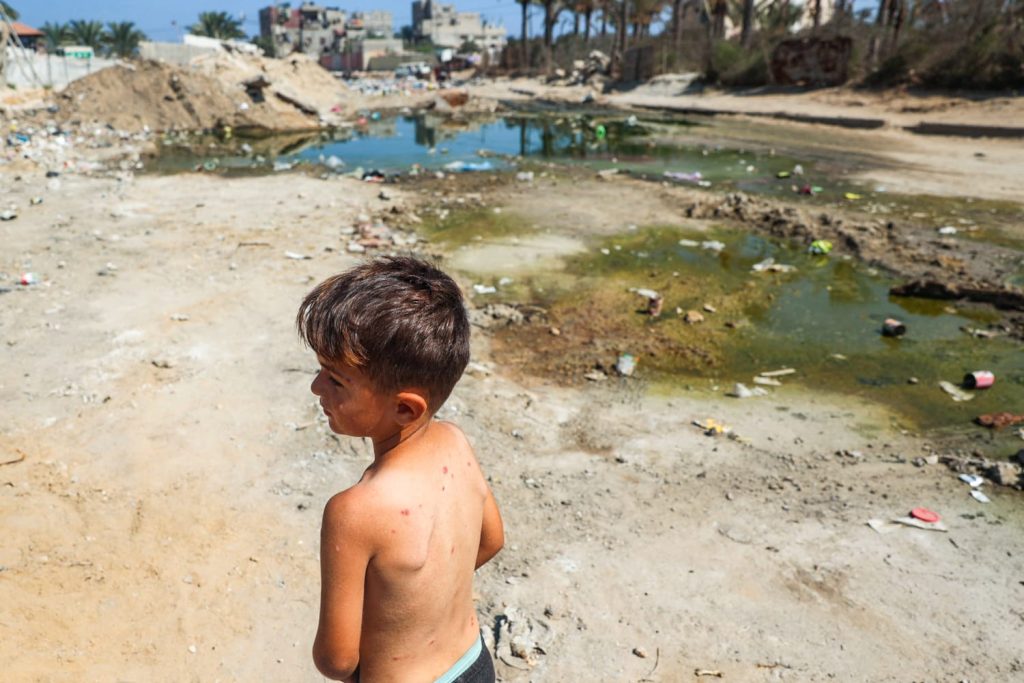Humanitarian and public health leaders around the world Polio may be spreading In Gaza, tests have detected the virus in wastewater samples.
The war-torn exclave, already struggling with poor sanitation, a crumbling health system and plummeting vaccination rates, stands little hope of tackling an outbreak of the highly contagious disease.
“That would be a catastrophe,” said Dr. Miskar Abutah, program manager for Project Hope, an international health nongovernmental organization that runs clinics in the Gaza Strip where polio has been found in the sewage.
There have been no confirmed cases of polio, but it is unclear whether doctors in Gaza have the resources to carry out polio tests.
of Global Polio Eradication InitiativeThe United Nations Office in Gaza, part of the World Health Organization (WHO), said 16 of the Gaza Strip’s 36 hospitals were “partially functional” but that less than half of the primary health care facilities were in use.
“The health infrastructure is collapsing,” Abu Taha said. “We don’t have the capacity to contain this outbreak.”
Wastewater samples taken from two locations in the Gaza Strip, Deir al-Balah and Khan Yunis, tested positive for the circulating vaccine-derived poliovirus type 2, Ayadil Saparbekov, WHO’s health emergencies team leader for the Gaza Strip and West Bank, said at a briefing on Tuesday.
“WHO considers that if this outbreak is not promptly and optimally addressed, there is a high risk of the virus spreading within Gaza and internationally,” Saparbekov said.
The results of the wastewater samples were available on July 16th, but the samples were taken on June 23rd – a full month earlier.
“Just imagine how much infection could have spread in that time,” said Sean Carroll, president and CEO of Anera, a nongovernmental organization that provides humanitarian aid to the Middle East, including Gaza. “It could have been a lot worse.”
The strain found in Gaza wastewater is related to the polio vaccine, which has not been used in the United States since 2000 but is still used in other parts of the world. The vaccine, which is administered orally, uses a weakened, live poliovirus.
The virus can be shed in human faeces, particularly: Sanitary conditions have deteriorated rapidly Israel cut off water, electricity and fuel supplies to the Gaza Strip following the Hamas attack on October 7. Attack on Israel.
Children in Gaza are vulnerable
Polio vaccination coverage in Gaza was good before the war between Israel and Hamas that followed the attack.
In 2022, polio vaccination coverage in the Occupied Palestinian Territory (including the Gaza Strip and the West Bank) was 99%. World Health Organization and UNICEF estimates.
That percentage has since fallen to 89%, the group said.
“There are thousands of children out there right now who are at risk of contracting this particular strain,” said Dr. Javed Ali, head of the Gaza emergency response for International Medical Mission, a nonprofit humanitarian organization. “It’s a nightmare.”
Speaking by phone with the WHO and other humanitarian organizations on Tuesday, Carroll said it was estimated that 250,000 children under the age of five in Gaza would need to be vaccinated to contain the spread of the virus. The vaccine, which is given orally, needs to be kept refrigerated – another hurdle to overcome in a region with little access to fuel for refrigeration.
Saparbekov said WHO and UNICEF personnel would arrive in Gaza on Thursday to collect human fecal samples as part of a risk assessment related to the virus discovery.
He said the assessment, which is expected to be completed by the end of the week, would enable health authorities to make recommendations including “the need for a mass vaccination campaign, what vaccine should be used and what age groups of people need to be vaccinated.”
The polio vaccine is long-lasting and considered highly effective. The CDC recommends four doses of the vaccine for children.At 2 months, 4 months, 6 to 18 months, and around 5 years old.
Three doses provide at least 99% protection, and a fourth dose provides lifelong protection. People may need additional booster shots later if they travel to countries where polio is endemic or if they did not receive all the doses as a child.
Abu Taha, of Project HOPE, said it was sad to see polio potentially spread in Gaza.
“We know what’s going to happen in the coming days and months, but there’s nothing we can do about it,” he said.


